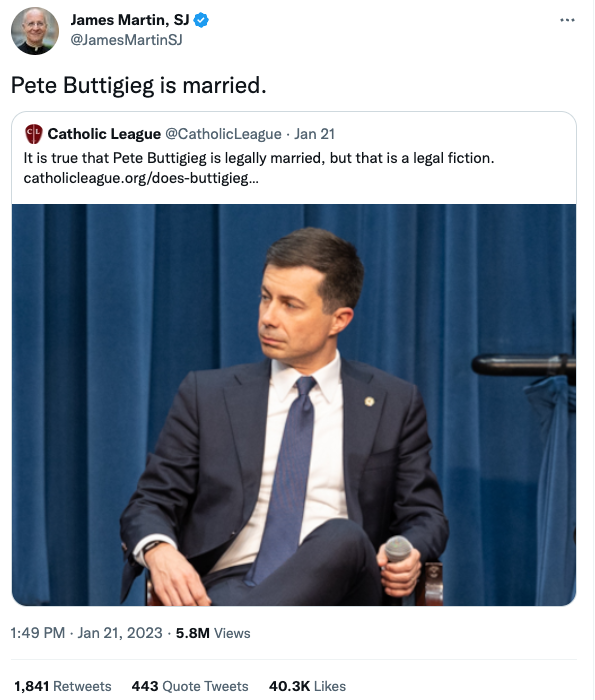Fr. James Martin was out doing Fr. James Martin things again yesterday, responding to a Catholic League piece which described civil same sex marriage as a "legal fiction" with the statement "Pete Buttigieg is married."
As a good friend noted, the ensuing tempest is predictable and boring. Having scandalized many orthodox Catholics, if pressed theologically Fr. Martin will announce, "Oh, I only meant civilly married. I of course agree with the Church's teaching on marriage." And so the dance of Fr. Martin pretending he doesn't disagree with Catholic teaching will continue. It's not just that some notable people in power seem to approve of Fr. Martin's antics, it's also that he has a strong Jesuit sense of how to make it clear to everyone what he really thinks while also maintaining the plausible deniability of never definitively saying something in clear contradiction of Church teaching.
However, in a society in which the Church's understanding of marriage is increasingly alien, it's perhaps worth taking a moment to consider the various senses in which Fr. Martin's statement could be taken, and the senses in which it is true or false from a Catholic point of view.
1) In civil law, Buttigieg is married to another man, Chasten, and they are entitled to the legal benefits that are associated with civil marriage. A Catholic dealing with this kind of situation in the legal realm would reasonably treat the civil marriage as existing.
2) Socially, in the mainstream culture, same sex marriage is seen as a thing that exists, and so it would be normal in social discourse to refer to someone's same sex spouse as a "husband" or "wife". I think it's reasonable for a Catholic to accede to this social convention even while disagreeing theologically. In a sense it's not different from referring to an oft-divorced man's fifth wife as "your wife" even while recognizing that marriage cannot in fact be validly dissolved and replaced in the manner which our civil law allows. The difference, of course, is that that relationship at least "looks like" a natural marriage in the sense that the Church would recognize it, while a same sex marriage does not. I think this is a distinction worth recognizing, but I don't necessarily think it would be a problem for a Catholic to refer to a same sex spouse as a "husband" or "wife" in social discourse.
3) A same sex marriage cannot exist as a 'natural marriage'. Natural marriage is the Church's term for a marriage between a man and woman who are not baptized, but nonetheless enter into a relationship which has the qualities which the Church would recognize as belonging to marriage: they intend to be faithful to each other, they intend to welcome any children they might have, they are not already married to someone else, they are one man and one woman, etc. Natural marriage is not a legal or social convention, it is a real, existing marriage which the Church must recognize but is simply not sacramental because it does not take place between baptized people.
4) If two people who are validly able to marry (not married already, opposite sexes, intend to be faithful, intend to welcome children, etc) and who are baptized Christians get married, those people are recognized by the Church as having entered into a valid sacramental marriage. Pete Buttigieg is an Episcopalian and thus one assumes someone who has been baptized. If he had married someone with whom the Church sees it as possible to enter into marriage (a woman) he would have been recognized as entering into a sacramental marriage.
There is an additional complication in terms of contracting a sacramental marriage if one of the parties is a baptized Catholic, but they do not marry in a valid Catholic ceremony. Church canon law requires that Catholics marry before the Church, and if someone baptized Catholic does not follow this rule, the Church does not see them as validly married. So if two Episcopalians get married in a civil ceremony, the Catholic Church would see them as sacramentally married, but if two Catholics did, the Church would not see them as sacramentally married. This stands to get a bit confusing, and it doesn't come into play here since the whole question in this case is whether a two men could be considered married in the first place.
So in looking at Fr. Martin's statement: It is not in and of itself wrong for Fr. Martin to refer to Pete Buttigieg's husband, if he was doing so in sense 1) or sense 2). If, for instance, Fr. Martin was at a social occasion and met Chasten Buttigieg, he might say, "Ah, hello, I was a fan of your husband's presidential run," without denying the Church's teaching on marriage.
However, it seems pretty clear that in posting, as a priest of the Catholic Church, and in argument with an article which sought to make the distinction between civil marriage and actual marriage as recognized by the Church, the unmodified phrase "Pete Buttigieg is married", Fr Martin is sowing confusion about Catholic teaching (and making clear how he wants it to change). But, of course, it can't change. And that Fr. Martin doesn't seem to recognize that is one of the basic senses in which he does not think with the Church.

1 comment:
I'm afraid that there might be a bit more complications here. You write: "1) In civil law, Buttigieg is married to another man", but that seems to presuppose that the laws in question (be they laws made by Congress or by courts) are valid. Yet, isn't it at least arguable that such a law is unjust, and, therefore, not a real law at all? And if so, even in that first case, there is no marriage.
Post a Comment